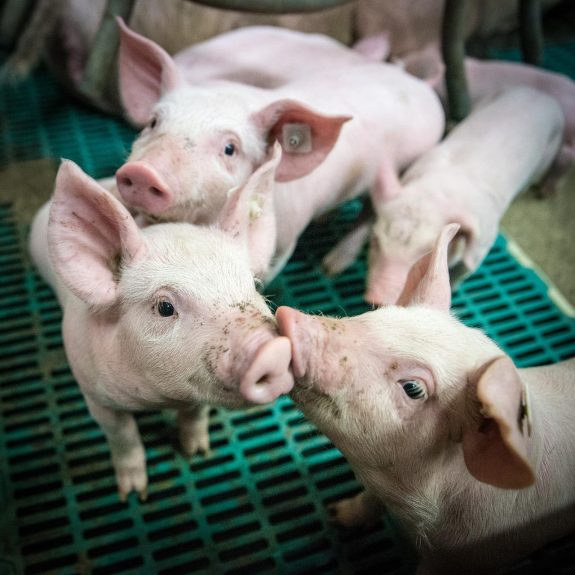Animal Justice is asking authorities to investigate after around 2,000 pigs were left to die at a HyLife factory farm near Kola, Manitoba, 300 kilometres west of Winnipeg. After news of the mass deaths came to light from concerned citizens, HyLife admitted in news reports that the pigs were left unattended and died on April 24, 2022 when the farm lost power due to a major storm system—even though pig farms are supposed to have functioning backup systems in case of power failure.
HyLife is still refusing to respond to inquiries from Animal Justice about how the pigs died, but one likely explanation is that they were poisoned by breathing in hydrogen sulfide, a toxic gas. Pigs produce an enormous amount of waste, which is generally stored in liquid manure pits underneath slats in the floor at factory farm barns. Without proper ventilation, hydrogen sulfide (as well as other toxic gasses like ammonia and methane) can build up and cause an agonizing death for these sensitive creatures.
It’s not clear how long it took for the pigs to die. But one case study from the UK where a ventilation system failed showed that many pigs slowly suffocated on poisonous hydrogen sulfide gasses, with some of them still alive after 16 hours of suffering. Symptoms of exposure to hydrogen sulfide include nausea, headaches, convulsions, paralysis, and tremors. Eventually breathing muscles are paralyzed, and pigs can no longer breathe.
According to the pig industry’s own internal rules, as well as an industry-supported code of practice from the National Farm Animal Care Council, pig barns must be designed in a way to ensure adequate air quality at all times, and protection against extreme temperatures. Farms are also required to have an emergency plan to “ensure that alternative means of temperature regulation, ventilation, feeding, and watering of pigs are available in the event of a power failure, mechanical breakdown, or other emergency situation.”.
HyLife executive Dave Penner has admitted the company failed to meet the industry’s own standards. Mr. Penner claimed that the HyLife’s backup generator and phone notification system both failed, leaving Canadians to wonder why a massive factory pig farm housing at least 2,000 animals would not have employee supervision at all times, or why no one checked on the animals during the storm at a bare minimum.
Animal Justice is calling on authorities to immediately launch an investigation into the mass casualties at HyLife’s factory pig farm, determine and publicly share how the pigs died, and determine whether the company violated provincial or criminal animal cruelty laws.



